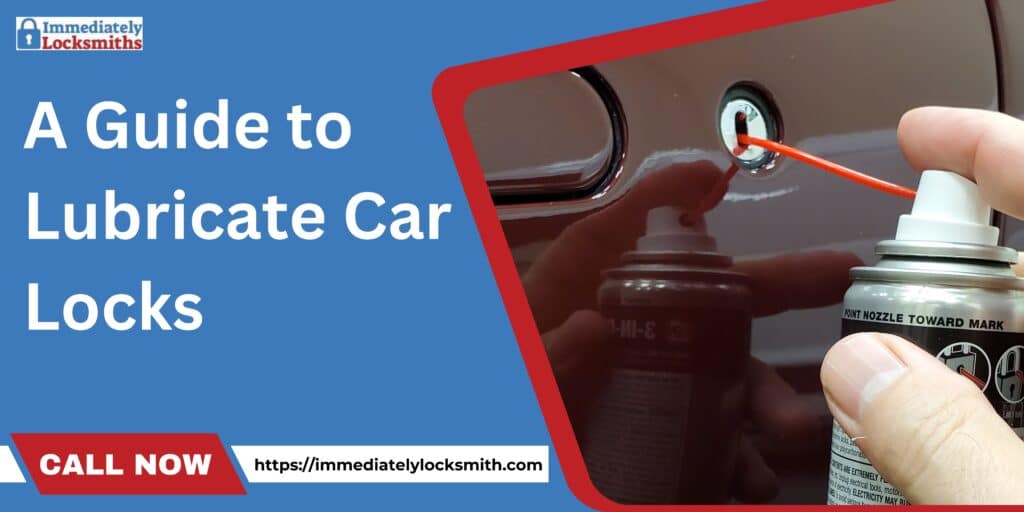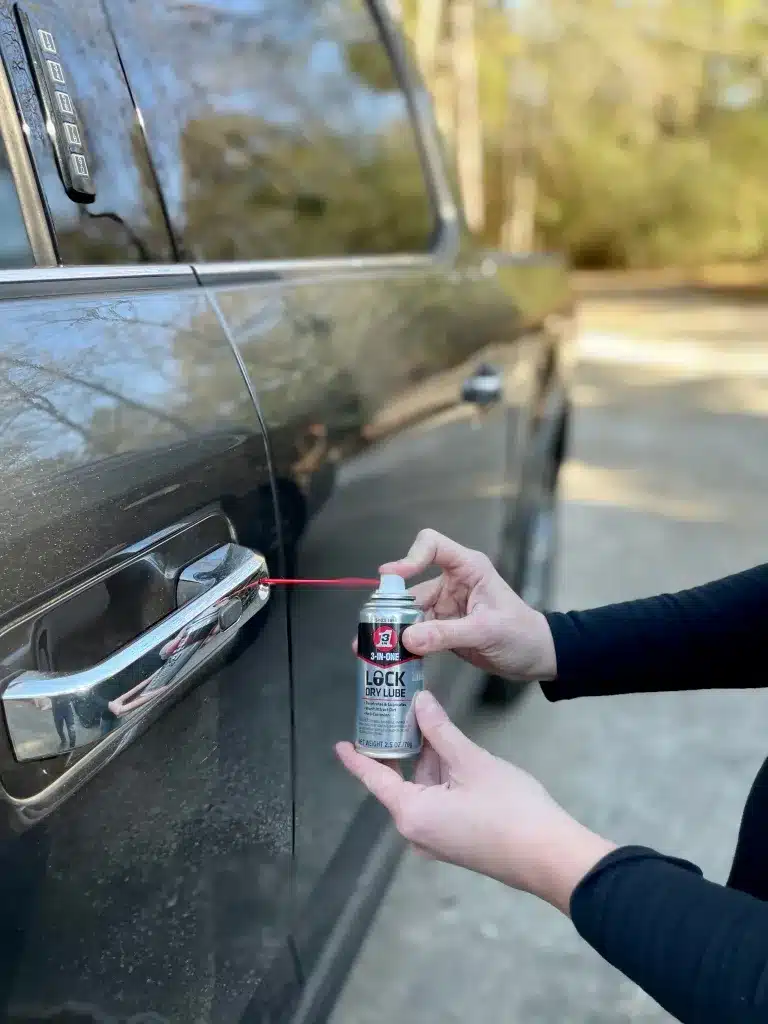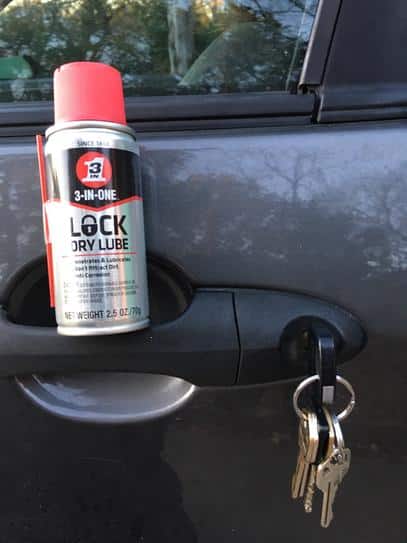
There are a number of reasons due to which Lubricate Car Locks started to become a necessity. Usually major reasons include moisture and dirt. These reasons cause the locks to become stiff and seize up over time. Proper maintenance, especially lubrication, can help extend the life of car locks and ensure the avoidance of unexpected lockouts. This guide will help to understand and cover things that are needed to know about the lubrication of car locks effectively. There are different types of lubrication options that are available for car locks.
How to Lubricate Car locks?
Car lubrication is important because the locks are more complex than they seem, involving tiny parts that can easily get clogged or wear down. When the locks become stiff, it can lead to key jamming, difficulty turning the lock or complete lock failure. Lubrication reduces the friction within these mechanisms, preventing rust and corrosion and ensuring the lock function in a smooth way.
Best lubricants for car Door Locks
Why to lubricate car locks? The answer is simple and easy to understand. Different types of lubricants are created to provide lubrication that helps resolve lock-related issues. Some of the types of lubrication for locks are under as:

Graphite Powder
A best option to lubricate the car lock is to use graphite powder. Unlike oil-based lubricants, graphite does not attract dirt, dust, or debris, making it ideal for outdoor use where exposure to the elements is a concern. When working outdoors and using a lock, graphite powder is the right choice. The extreme temperature of graphite powder gives the lock an enhanced range of performance. Despite these benefits, one has to ensure that only small amounts of graphite can be applied as graphite powder does not cause a mess to ensure proper operation of any vehicle lock.
Silicone-based Lubricants
For car locks, a silicone-based spray can be particularly effective in maintaining the lock system. Such lubricants guarantee a protective coating that helps reduce friction on the moving parts. Silicone lubricants do not mix with water and can be used on the door locks to prevent corrosion and rust. The silicone-based sprays come with a nozzle to enable easy application. Moreover, they dry fast and leave a thin layer to enhance the workings of locks. Such sprays are ideal for different climates because of the temperature tolerance, allowing the proper functioning of the lock throughout the year.
Teflon Lubricant
Another type of lubricant that can be used is Teflon/PTFE lubricant. Cars with ignition systems often have a barrel lock that connects it to the steering column. It is then later accompanied by 3 to 4 other locks on the car doors, hatch, and trunk. For ease of use, these components can be lubricated with a Teflon lubricant. Teflon is a lubricant for car keys and locks that has a property that allows the barbels in the lock to be moved freely when the key is inserted.
The SB Teflon PTFE lock lubricant is suitable for any car security component. The Teflon locks provide smooth movement for all keyed components, which helps take care of friction. Users can apply the Teflon quite easily in either spray or paste form. Teflon is a durable construction material and requires only a single application to strengthen and ensure the longevity of auto locks.
White Lithium Grease
White lithium grease is an excellent multipurpose lubricant that is used for automobile locks. The thick consistency and superior adherence of this grease are the result of its formulation with lithium soap. Because of its high resistance to moisture and corrosion, white lithium grease is perfect for use in outdoor settings. Because of its friction-reducing properties, locking mechanisms are less likely to stick or jam. You may precisely target the lock components while applying the grease with a spray or brush.
Car owners may make their locks last longer, work reliably, and keep their keys safe by using white lithium grease. It is necessary to understand the importance of using Lithium grease as lubrication.
Dry Spray Lubricant
When it comes to auto locks, a dry spray lubricant is your best bet, particularly in dusty or dirty areas. Dry spray lubricants include a carrier that evaporates, leaving behind a thin layer of lubrication, as opposed to standard lubricants that might collect debris. Because this coating lowers friction, locks may run freely and reliably without being jammed up with use.
To further aid in protecting lock components from rust and wear, dry spray lubricants often include chemicals that provide corrosion resistance. When it comes to keeping auto locks working while reducing stress and then dry spray lubrication is a good option. Using this option helps to provide ease along with making the lock lubricated.
When to Seek Professional Help
Usually, car lubrication does not solve the issue and car locks can still malfunction. If it happens then the need is to consult a professional.

Repeated Key Jamming
Repeated key jamming in the car locks is a frustrating experience for the drivers. This issue usually arises when dirt or old lubricant accumulates inside the lock cylinder. It hinders the smooth operation of the key. As the time passes, the usage of car keys into the locks make the lock jammed. It is the time when a car lock lubrication is important to be used.
Usually dirt makes the problem worse. The best way is to use a good lubrication agent and apply it on the lock. Taking this step helps to prevent the key jams and ensure the smooth operation of the lock without any problem. It is important to increase the overall security of the vehicle that leads to life extension of the locks.
Complete Lock Seizure
A complete lock seizure occurs, and then a car lock becomes entirely immobilized, making it impossible to turn the key. It is an issue that can result from several factors, including the accumulation of dirt within the lock cylinder. This dirt can make the internal components corrode. It is inconvenient when a person is not able to access the car. To address this problem, it is important to avoid key forcing. It is important to carefully disassemble, clean, and lubricate with suitable products like silicone-based sprays or graphite powder to restore functionality. It is a kind of problem that happens due to dirt.
Electronic Lock Issues:
Electronic locks provide more security and convenience, but still, they are not immune to malfunctions. One typical issue is when the batteries fail, which makes the lock useless. The lock’s sensitivity to keypads or fobs may also be compromised because of software errors.
Malfunctions in electronic components can also be caused by environmental factors like high temperatures or dampness. Incorrect installation can lead to alignment problems, which can make the lock jam. These issues can be minimized, and the lifetime of electronic locks can be extended with regular maintenance. It is important to deal with these locks with care.
FAQs
What is a good lubricant for locks?
Choosing a good lubricant requires understanding about the right type of lubricant including WD-40 or graphite. It is ideal because lubricating the lock repels the dust and water. It means that the fixing of the lock by using such a type of lubricant allows one to expect the lock to be in good shape.
Is Vaseline good for locks?
One of the best options for the person is to use Vaseline as a lubricant. Make sure to insert into the lock and turn it back and forth. It is important to repeat the process for some time to ensure that the jelly is evenly distributed through all parts of the lock.
What is the best oil for car door locks?
The best lubricant for the lock is to use the PTFE lubricant or graphite powder. Both of these lubricants are best options that can be used to take care of lubrication iss.e Usually, oil based products can attract dirt and dust that can damage the internal mechanism of the lock.
Can you spray oil into a lock?
Don’t use oil. Oil might assist the moving parts of the motor in your car, but it is never a good idea to squirt it in a stiff lock. The oil will just combine with any grime already in the mechanism and compound the situation.
What is OK to spray in a lock that is sticking?
You don’t want oil and moisture in your lock, so you’ll want to use a graphite or silicone spray rather than your regular WD-40 or other oil-based lubricants. WD-40 does make a product specifically for locks, WD-40 Specialist Dry Lubricant and we also like 3-IN-ONE’s Lock Dry Lube.
Conclusion
Maintaining the car locks is important for ensuring security and convenience. By understanding the types of lubrication, it is important to use the right one for effectively preventing issues like lock seizures and key jamming.. Regularly lubricating the lock can help to enhance the functionality of locks along with increasing the lifespan.




